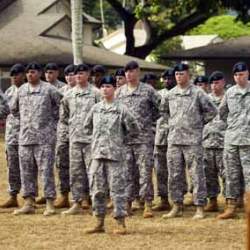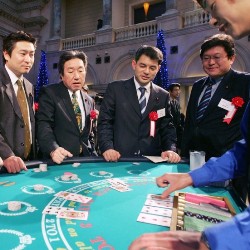Problem Gambling and the US Army

If you’ve never served in the Armed Forces, then gambling is unlikely to be the first thing that you think about when someone mentions the “Army.” However, gambling has a long history within the military, but many people today are beginning to wonder whether or not that history should be allowed to continue.
Recreational Gambling Culture
Soldiers only spend a small fraction of their time on the battlefield, with much of a military service member’s time spent waiting for orders. The boredom and anxiety about what might lie ahead can seriously hurt morale, and this why gambling has long been seen as a harmless way for soldiers to pass the time.
In the military, gambling takes many forms. For example, soldiers may gather for informal games of poker and dice to pass the hours; regiments may make bets against one another to see who performs best during training exercises in order to keep the teams motivated; while junior rank halls at US and UK army barracks are often home to slot machines. Studies further suggest that many soldiers also use mobile sites and apps to gamble.
Morality and Legality of Situation
Is gambling legal in the military? In the United States, it’s not exactly clear. An Air Force publication quoted in a recent online article says plainly that gambling should not take place on government-owned property, which would therefore make it illegal to gamble on military bases, but perhaps not in the field. There are also estimated to be 5,000 slot machines spread across more than 100 US overseas bases regardless of whether or not it is legal for them to be where they are.
The United Kingdom sanctions the use of fixed odds betting terminals in barracks, but when questioned about the morality and legality of allowing soldiers to gamble, the UK Minister of Defence stated that the terminals are just intended to be for amusement, and are not banned under the laws of the United Kingdom.
Those who support gambling in the military say that banning it would cause more harm than good, as operators who provide slots and fixed betting odds terminals share proceeds with the military, so eliminating them would mean that a lucrative source of revenue suddenly dries up. Plus, many argue that eliminating gambling would lead to low morale, and make those long nervous waits for news about orders unbearable.
Gambling Addiction Concerns
Still, not everyone supports legal gambling in the military, and concerns exist that soldiers may be at an increased risk from gambling addiction due to the stress of their jobs, and the potential for post-traumatic stress disorder. In the meantime, the National Council on Problem Gambling estimates that roughly 36,000 to 48,000 active U.S. service members are addicted to gambling. While official numbers have not been released for the UK, the Royal British Legion does provide support services for gambling addiction, suggesting that there are individuals who have self-identified as problem gamblers or gambling addicts in the ranks.
In 2015, the US Governmental Accountability Office ordered a report to determine whether US servicemen were being provided adequate help to deal with addiction problems, in light of the revelation that Department of Defense was generating a massive $100 million in annual slots revenues from its machines based oversea. As Senator Elizabeth Warren (D-MA) subsequently explained at the time:
“If the military is going to operate gambling facilities that bring in tens of millions of dollars in revenue, it also needs to ensure there is adequate prevention, treatment, and financial counseling available for service members struggling with gambling addictions.”
A study conducted earlier by the University of Georgia also suggested that Military personnel who had experienced negative consequences from gambling, such as increased stress from accruing financial debts, may be less combat ready in a real military situation. Rather than banning gambling outright, however, military officials are now becoming more focused upon screening for possible sign of addiction during the recruitment process, as well as providing a greater level of education about problem gambling within the armed services, and ensuring that resources are easily accessible for those soldiers that are in need of help.










